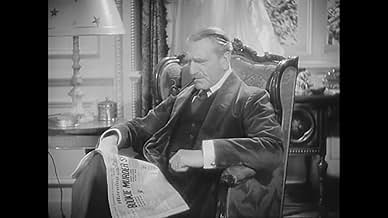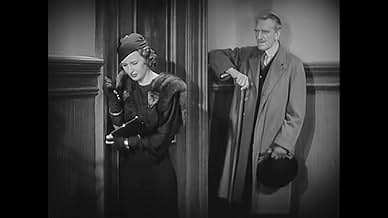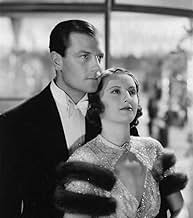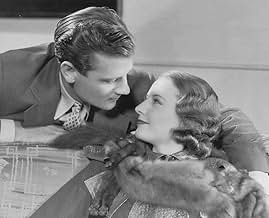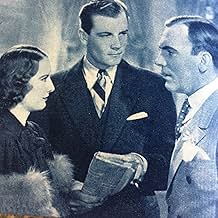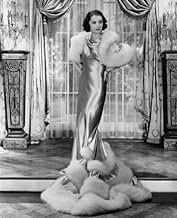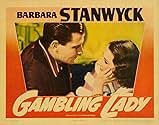IMDb RATING
6.5/10
1.3K
YOUR RATING
Lady Lee, gambler's daughter, plies her trade while pondering the proposal of a social-register suitor.Lady Lee, gambler's daughter, plies her trade while pondering the proposal of a social-register suitor.Lady Lee, gambler's daughter, plies her trade while pondering the proposal of a social-register suitor.
Enrique Acosta
- Gambler at Monte Carlo
- (uncredited)
Ernie Alexander
- Bellboy
- (uncredited)
Frank Austin
- Syndicate Board Member
- (uncredited)
William Austin
- Sargey - Fallon's Secretary
- (uncredited)
William Bailey
- Racetrack Spectator
- (uncredited)
Featured reviews
Stanwyck plays an honest gambler and she steals the movie. After she ("Lady" Lee) realizes she can't rely on her gambling father, she meets wealthy Joel McCrea, who is, well, young and smitten. Find acting by all, including Pat O'Brien as Stanwyck's buddy and Sir C. Aubrey Smith as a father figure.
I just saw this movie shortly after seeing "But the Flesh Is Weak" on Turner Classic Movies. Sir C. Aubrey Smith is also in that movie, in which he plays the gambling father of young Robert Montgomery, who is smitten by wealthy Nora Gregor and is buddies with wealthy Heather Thatcher. Both movies have a similar parent-child duo wanting to strike it rich, and the start of each movie is similar. But from there on, they are two very different movies, "Gambling Lady" being a more thoughtful, dramatic film, and "But the Flesh Is Weak" being a romantic romp.
I just saw this movie shortly after seeing "But the Flesh Is Weak" on Turner Classic Movies. Sir C. Aubrey Smith is also in that movie, in which he plays the gambling father of young Robert Montgomery, who is smitten by wealthy Nora Gregor and is buddies with wealthy Heather Thatcher. Both movies have a similar parent-child duo wanting to strike it rich, and the start of each movie is similar. But from there on, they are two very different movies, "Gambling Lady" being a more thoughtful, dramatic film, and "But the Flesh Is Weak" being a romantic romp.
A high-minded GAMBLING LADY runs into trouble when she becomes connected with a society family.
Breezy & entertaining, this was the sort of film which Warner Brothers created with such ease. Blessed with good acting & fine production values, these pictures were generally guaranteed to be crowd pleasers.
As always, Barbara Stanwyck is utterly fascinating to watch. Not only talented & lovely, Stanwyck's great forte was her utter believability in any role she undertook. Here, she looks perfectly natural with a deck of cards in her hand, playing & dealing. Her authenticity is matched by the passion which she displayed with every performance.
Her leading men are two of the best: rich boy Joel McCrea & genial crook Pat O'Brien - both do well by their roles. Given equal billing, the viewer is left guessing for quite a while which one will finish the film in Stanwyck's arms.
Excellent support is given by marvelous old Sir C. Aubrey Smith as a kindly gentleman who befriends Stanwyck, Arthur Vinton as the head of a notorious Gambling Syndicate & eccentric little Ferdinand Gottschalk as Sir Aubrey's lawyer.
Movie mavens will recognize Willie Fung as a member of the Syndicate, and Arthur Treacher & Louise Beavers as Sir Aubrey's butler & cook - all uncredited.
Breezy & entertaining, this was the sort of film which Warner Brothers created with such ease. Blessed with good acting & fine production values, these pictures were generally guaranteed to be crowd pleasers.
As always, Barbara Stanwyck is utterly fascinating to watch. Not only talented & lovely, Stanwyck's great forte was her utter believability in any role she undertook. Here, she looks perfectly natural with a deck of cards in her hand, playing & dealing. Her authenticity is matched by the passion which she displayed with every performance.
Her leading men are two of the best: rich boy Joel McCrea & genial crook Pat O'Brien - both do well by their roles. Given equal billing, the viewer is left guessing for quite a while which one will finish the film in Stanwyck's arms.
Excellent support is given by marvelous old Sir C. Aubrey Smith as a kindly gentleman who befriends Stanwyck, Arthur Vinton as the head of a notorious Gambling Syndicate & eccentric little Ferdinand Gottschalk as Sir Aubrey's lawyer.
Movie mavens will recognize Willie Fung as a member of the Syndicate, and Arthur Treacher & Louise Beavers as Sir Aubrey's butler & cook - all uncredited.
Gambling Lady (1934)
** 1/2 (out of 4)
Warner melodrama has a poker player (Barbara Stanwyck) going to the other side of the tracks by marrying a social boy (Joel McCrea) but she can't get away from her bookie friend (Pat O'Brien). This is a decent little film that only runs 66-minutes so if you're needing time to kill then this movie can fill that void. The movie has a very familiar story and I'm convinced that Warner just re-used this story over and over and just changed the character names. If you've seen one film about a bad girl switching sides then you won't find any shocks here but the three leads keep the film moving well. Stanwyck is once again good in her role as is McCrea but the film certainly belongs to C. Aubrey Smith who plays McCrea's father. His comic timing and mature performance certainly sticks out among the major cast. O'Brien adds nice support in his small role as does Claire Dodd as the woman after McCrea. Again, this quickie really doesn't offer anything new but if you've got time to kill and enjoy the cast it isn't too bad.
** 1/2 (out of 4)
Warner melodrama has a poker player (Barbara Stanwyck) going to the other side of the tracks by marrying a social boy (Joel McCrea) but she can't get away from her bookie friend (Pat O'Brien). This is a decent little film that only runs 66-minutes so if you're needing time to kill then this movie can fill that void. The movie has a very familiar story and I'm convinced that Warner just re-used this story over and over and just changed the character names. If you've seen one film about a bad girl switching sides then you won't find any shocks here but the three leads keep the film moving well. Stanwyck is once again good in her role as is McCrea but the film certainly belongs to C. Aubrey Smith who plays McCrea's father. His comic timing and mature performance certainly sticks out among the major cast. O'Brien adds nice support in his small role as does Claire Dodd as the woman after McCrea. Again, this quickie really doesn't offer anything new but if you've got time to kill and enjoy the cast it isn't too bad.
Most people have a main reason for wanting to see a film, whether it's the concept, being a fan of a director, loving an actor or actress, having a thing for talented casts and curiosity. They have all been reasons for seeing a film numerous time, whether it's one of those, more than one or all. My main reason was Barbara Stanwyck, she was in a fair share of films that had material well beneath her but she always rose above it and very rarely gave a bad performance.
One can't go wrong with Joel McCrea in his first of six films with Stanwyck, when in a role that suits him, and C. Aubrey Smith who was always a scene stealer. Archie Mayo was not the most consistent of directors, but he was a more than able one and did do enough films that are worth watching such as 'Black Legion', 'It's Love I'm After' and 'The Petrified Forest'. 'Gambling Lady' doesn't see any of them at their best and all did much better films, but it is definitely worth a look and has enough to it to make it more than just a curio.
The cast is 'Gambling Lady's' biggest strength, so good that it is worth more than one star of my decided rating for the film. Stanwyck brings her usual steely toughness and has a sensuality also here too, making her character a lot more interesting than she seemed on paper. McCrea, in his first collaboration with Stanwyck, is likeable and plays his on paper not particularly interesting with cool charisma. O'Brien is good despite his underuse and makes the most of his too little material. Claire Dodd is suitably hissable. It was a shock to see Smith in the type of role he plays here and he was clearly having a lot of fun with it and some particularly juicy dialogue.
Some very funny moments in the script, which sparkles at its best. 'Gambling Lady' moves swiftly, is directed in tight fashion by Mayo and it is a good looking film too (not lavish but very nicely shot, some beautifully framed ones here, and always cohesively edited). Stanwyck looks great in her clothes.
'Gambling Lady' has its faults though. For pre-code, some of the material could have afforded to be bolder than turned out and edgier too. The ending comes across as very melodramatic and contrived, and some parts are on the soapy side.
Biggest drawback is the story. Pre-code films were often thin on the ground and silly in this regard, but the story here is very flimsy, in content initially and in depth, and sometimes later on over-complicated from trying to stuff too much in. It takes silliness and credibility straining to a whole new level, with some serious suspension of disbelief here needed to the extent that little makes sense. No real surprises here either.
Overall, not bad but not great. Just about worth taking a gamble on though. 6/10
One can't go wrong with Joel McCrea in his first of six films with Stanwyck, when in a role that suits him, and C. Aubrey Smith who was always a scene stealer. Archie Mayo was not the most consistent of directors, but he was a more than able one and did do enough films that are worth watching such as 'Black Legion', 'It's Love I'm After' and 'The Petrified Forest'. 'Gambling Lady' doesn't see any of them at their best and all did much better films, but it is definitely worth a look and has enough to it to make it more than just a curio.
The cast is 'Gambling Lady's' biggest strength, so good that it is worth more than one star of my decided rating for the film. Stanwyck brings her usual steely toughness and has a sensuality also here too, making her character a lot more interesting than she seemed on paper. McCrea, in his first collaboration with Stanwyck, is likeable and plays his on paper not particularly interesting with cool charisma. O'Brien is good despite his underuse and makes the most of his too little material. Claire Dodd is suitably hissable. It was a shock to see Smith in the type of role he plays here and he was clearly having a lot of fun with it and some particularly juicy dialogue.
Some very funny moments in the script, which sparkles at its best. 'Gambling Lady' moves swiftly, is directed in tight fashion by Mayo and it is a good looking film too (not lavish but very nicely shot, some beautifully framed ones here, and always cohesively edited). Stanwyck looks great in her clothes.
'Gambling Lady' has its faults though. For pre-code, some of the material could have afforded to be bolder than turned out and edgier too. The ending comes across as very melodramatic and contrived, and some parts are on the soapy side.
Biggest drawback is the story. Pre-code films were often thin on the ground and silly in this regard, but the story here is very flimsy, in content initially and in depth, and sometimes later on over-complicated from trying to stuff too much in. It takes silliness and credibility straining to a whole new level, with some serious suspension of disbelief here needed to the extent that little makes sense. No real surprises here either.
Overall, not bad but not great. Just about worth taking a gamble on though. 6/10
Barbara Stanwyck, Joel McCrea, Pat O'Brien, and C. Aubrey Smith star in "Gambling Lady," a 1934 film directed by Archie Mayo.
Stanwyck plays "Lady" Lee, the daughter of Mike Lee, who runs the only honest gambling joint in town. The rest are owned by a syndicate.
After Mike kills himself, Lady Lee gets a job with the syndicate, but she will only play honestly. She turns out to be quite the card shark.
Lady attracts a wealthy man, Garry Madison (McCrea) and the two marry. But jealousy enters the picture when Sheila Aiken (Claire Dodd) shows up and tries to get Garry away from Lady.
Nice film, on the short side, with good performances from Stanwyck, McCrea, O'Brien as Lady's friend, and C. Aubrey Smith as Garry's father.
Stanwyck is very young here, with the edge and toughness that will make her one of the great stars. McCrea is as handsome and likable as ever.
Recommended for the performances.
Stanwyck plays "Lady" Lee, the daughter of Mike Lee, who runs the only honest gambling joint in town. The rest are owned by a syndicate.
After Mike kills himself, Lady Lee gets a job with the syndicate, but she will only play honestly. She turns out to be quite the card shark.
Lady attracts a wealthy man, Garry Madison (McCrea) and the two marry. But jealousy enters the picture when Sheila Aiken (Claire Dodd) shows up and tries to get Garry away from Lady.
Nice film, on the short side, with good performances from Stanwyck, McCrea, O'Brien as Lady's friend, and C. Aubrey Smith as Garry's father.
Stanwyck is very young here, with the edge and toughness that will make her one of the great stars. McCrea is as handsome and likable as ever.
Recommended for the performances.
Did you know
- TriviaBarbara Stanwyck voiced her displeasure with working with director Archie Mayo. The director was notorious for slapping, groping, and pinching the rear ends of his leading ladies. When he tried for the first (and last) time to pinch Barbara Stanwyck's bottom, she grabbed his arm and loudly told him to cut it out.
- GoofsIn the opening visual credits, actor Arthur Vinton's character is listed as "Fallin." However, in the film, the door of his office bears the name "Fallon Investment Co."
- Quotes
Peter Madison: I'd like to contribute to this, I think.
Charlie Lang: You're on, Peter.
Peter Madison: The last of his kind, eh? An honest gambler. Here's a hundred for you.
Charlie Lang: And here's the payoff: he died broke.
- ConnectionsReferenced in Thou Shalt Not: Sex, Sin and Censorship in Pre-Code Hollywood (2008)
- SoundtracksThe Wedding March
(1843) (uncredited)
from "A Midsummer Night's Dream, Op.61"
Music by Felix Mendelssohn
Played on an organ after the wedding
Details
- Runtime
- 1h 6m(66 min)
- Color
- Sound mix
- Aspect ratio
- 1.37 : 1
Contribute to this page
Suggest an edit or add missing content

